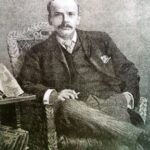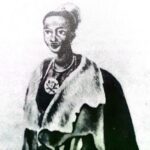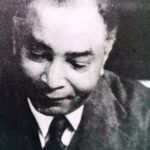MONTSHIWA
- 5 Min Read
Montshiwa (circa 1814-October 19, 1896) became the chief of the BaRolong Boo Ratshidi, a southern Tswana chiefdom, in 1849 and led his people through nearly five decades of struggles to secure inalienable rights to land located south of the Molopo River.
He fought against the counterclaims of Afrikaner farmers and their local Tswana allies by appealing for British protection and by trying to create an alliance among neighboring Tswana chiefdoms. Both means failed to prevent the incorporation of his people and their land into the Cape Colony.
Born to the chief Tawana and his head wife Sebudio at Tswaneng, near the Molopo River, in about 1814, Montshiwa spent eight years of his minority at Thaba Nchu (1833-41) where his father had been granted refuge from Ndebele raids by chief Moshoeshoe of the BaSotho.
In 1832 he was initiated into Mantwa regiment. When Montshiwa inherited the chieftainship in 1849, one of his first recorded acts was to send his brother Molema to the Wesleyan District Missionary Society at Thaba Ncho to ask for a missionary. Montshiwa settled at Mafeking.
Conflict with the expanding South African Republic (S.A.R.) began in 1852 when the Sand River Convention failed to define clearly the border between the Republic and the land of the BaRolong Tensions between the Afrikaner Republic and Montshiwa mounted, Montshiwa refused to help a commandant fight against chief Setshele of the BaKwana, and he was accused of raiding Afrikaner cattle. The Afrikaners sent a commando to make reprisals and Montshiwa lost several men; he then moved his people to refuge under the RaTlou “clan.”
In 1857, Montshiwa allowed his brother and deputy, Molema, to settle at Mafeking, a place to which he would return for his final refuge 24 years later. In the intervening years, Montshiwa settled (1859-76) at Moshaneng in Ngwaketse, where he had helped Chief Gaseitsiwe to retain his power, and at Sehuba on the Molopo River (1876-81). From each of these places of refuge, he was driven by the Afrikaner settlers’ appropriation of his land and by their demands for labor and tax. He suffered frequent attacks and cattle raids by them and their Tswana allies.
At a conference convened between various chiefs and representatives of the SAR in 1870, Montshiwa had claimed BaRolong land by virtue of inheritance and treaties. The Keate arbitration court in 1871 upheld his territorial claims, but they were ignored by the SAR and its allies Moshete of the RaTlou, Matlaba of the Rapulana, and Mosweu of the Korana.
In 1874 Montshiwa appealed to Lieutenant Governor Richard Southey for help against the Afrikaners and their allies who had moved into his territory; he asked that he and his people be declared British subjects, a request that he would continue to make, unsuccessfully, for the rest of his life.
Theophilus Shepstone, Administrator of the Transvaal following the British victory in the first Anglo-Boer War (1877), failed to answer his protests against the presence of Afrikaner squatters on his land at Poosedumane Mey-fontein), against the occupation of his land at Bodibe (Polfontein) and the theft of his herds by Malaba, and against Moshete’s occupation of Khunwana (in Lichtenburg district).
Hoping to win British support, Montshiwa sided with them in 1878 against the BaThaping, Griquas and Korana; in 1879 he offered them his help in exchange for ammunition, in the “Transvaal War of Independence.” He tried in 1880 to unite all the chiefs along the Molopo River in support of the British, but failed. He sent his son, Kebalepile, to Henrique Shepstone, Secretary for Native Affairs in Pretoria, in 1881 to convey his grief that the British had given the Transvaal back to the Afrikaners. A few months later, he wrote to the British resident at Pretoria and accused the Transvaal Afrikaners of inciting Matlaba and Moshete to attack him. None of these gestures won British support.
Montshiwa unsuccessfully attacked Matlaba at Lotlhakane (Rietfontein) in 1881, aided by the Ngwaketse and BaHurutshe of Linokana. For the next three years, he was the victim of raids launched by Moshete and his Afrikaner “volunteer” soldiers By 1882 he had lost to them three-quarters of his land, on which the “volunteers”. created the Republic of Goshen.
Although the London Conven-lion (Feburary 27, 1884) established a British protectorate over the Republics of Goshen (BaRolongland) and Stellaland (BaThapingland), the local treaties which were negotiated by John Mackenzie, Deputy Commissioner, were cancelled by his successor, Cecil John Rhodes, and the Goshen “volunteers” continued to force Montshiwa to grant them unconditional rights to his land and over his people.
The raids stopped only as a result of General Sir Charles Warren’s expedition which led to the proclamation of the Bechuanaland Protectorate north of the Molopo River and of British Bechuanaland to the south. In 1890 Montshiwa rebuffed Rhodes’ offer of administration either by the Cape Colony or by the British South Africa Company; five years later he was still embroiled in efforts to avoid annexation and petitioned High Commissioner Sir Hercules Robinson and Queen Victoria for British protection.
In 1892 his scheme to protect Barolong land north of the Molopo River was approved by the British; 41 farms were created there and distributed to his sons and other important Barolong on an individual basis. This system of land tenure was maintained through the end of the 1950s.
On October 3, 1895 British Bechuanaland became part of the Cape Colony. Montshiwa died the following year, having lost his long struggle for the territorial sovereignty and self-determination of the Barolong Boo Ratshidi.
DIANA WYLIE





